Rare Disease Day takes place on the last day of February each year to raise awareness of conditions commonly unknown to the public.
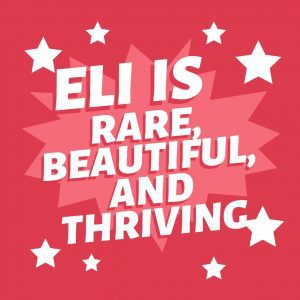
Two-year-old Eli Amundson is 1 in under 500 individuals around the world to be born with Rothmund-Thomson Syndrome (RTS). This rare genetic condition affects many parts of the body, especially the bones and skin. Through a heartfelt interview with his incredible mom, Brittany, we witness the strength and fierce love of a mother, the resilience and impact of a beautiful, unique little boy, and the importance of having a village of support.
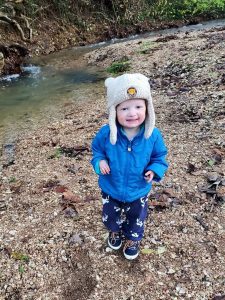
Ben and Brittany Amundson were thrilled to welcome a third child into their family when their typical prenatal journey shifted at their 20-week anatomy scan, showing bone and growth abnormalities in his arms. After a more detailed ultrasound and establishing a high-risk team of support for the rest of the pregnancy, there were more questions than answers. None of the doctors had seen anything like this before, so they monitored closely (2-3 times per week) until Eli made his grand entrance into the world on May 18, 2018, weighing in at 4lb 4oz at 38 weeks gestation. After his birth and lots of testing, the waiting continued …
“The waiting is awful for anything, especially when you are waiting for answers for your child,” Brittany shared about the prolonged uncertainty.
At four months, Eli’s eyelashes had fallen out, and at six months, he had developed a rash on his face, arms, and legs. After a full genetic panel paired with the symptoms he experienced, they were finally able to identify RTS.
According to the Rothmund-Thomson Syndrome Foundation, RTS is characterized by the following clinical features:
- A unique skin rash that begins in infancy, usually on the cheeks, and spreads to the arms and legs, and persists for life.
- Sparse/absent scalp hair, eyebrows, and/or eyelashes
- Small stature
- Diarrhea and/or vomiting in early childhood
- Bone deformities
- Dental and nail abnormalities
- Juvenile cataracts
- Cancer: skin (usually basal cell or squamous cell carcinomas) or bone (osteosarcoma)
Finding out your child has a genetic condition is both shocking and life-changing. There are a lot of “what-if” questions and worst-case scenarios. As parents-to-be, we tend to have a plan in our minds as to how things will go and how life will look, with typical expectations and a linear path. Many can relate to Brittany when she explains the surreal feeling and the fact that raising a child with special needs was something she hadn’t thought about.
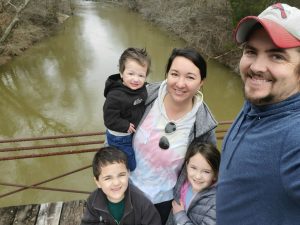
Ben and Brittany dove in and learned all they could about Rothmund-Thomson Syndrome, but with only 300-500 people diagnosed around the globe, they have little access to research and resources and no local community to join for support. The Admundsons are grateful for their medical team and for their small online RTS community to connect with and ask questions. However, they still feel very much on their own in their journey with Eli, as each person’s symptoms present very differently.
When it comes to resilience and rising to the occasion, Eli shows up BIG time, and always with the sweetest smile on his face! Developmental milestones may take a bit longer to achieve, appointments fill their calendar, and multiple upcoming surgeries for his arms are in the near future, but he never gives up and is determined to do what his older siblings do!
“We are raising him to know that he is exactly who he is supposed to be, and he can do whatever he puts his mind to.
We don’t limit him.”
They love to camp, hike, and spend lots of time outdoors. Eli pushes himself and enjoys everything fully with his family. He is fun, silly, strong-willed, loves dinosaurs, and marches to the beat of his own drum! He is doing everything a typical kid his age can do.
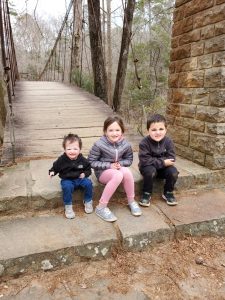
“It’s incredible to watch this little guy thrive and take on things that we didn’t know if he’d be able to do … He’s amazing!
He plays exactly like our other kids play; he just does it in his own way.”
Raising a child with a rare condition comes with its challenges. Still, Eli is much more alike than different, and the impact he has had on the Amundson family and surrounding community has been such a blessing. In the beginning, older siblings Ellie and Ethan were very curious about why he doesn’t have a thumb, why he can’t straighten his arms, etc. Now, they hardly focus on the differences at all. Everything has just become part of their normal life.
“I know my kids are going to be better people and so well-rounded because of having Eli as their brother and what they see our family going through as a team, together.
They are his little warriors.”

When asked about how life with Eli has changed their lives, Brittany admits that before he came into their lives, she was not quick to ask for help and thought she could do things on her own. Now, she has a deeper realization that you aren’t meant to do it alone; you need your village of people to lean on and support your family, and you need faith to get through uncertain times with hope.

Brittany encourages parents to teach their kids about differences, to not be afraid to talk about it, to not be afraid to say hello, and to ask questions. With so many rare conditions and diseases (an estimated 25-30 million Americans), she feels it should be less taboo and more normal to ask questions – she is happy to educate, and it’s never offensive when people are curious.
“I would love to see any and every small and rare disease come to light, and for people to have their eyes opened to the fact that every family is going through something … we should be kinder to people because you just never know what others are going through.”
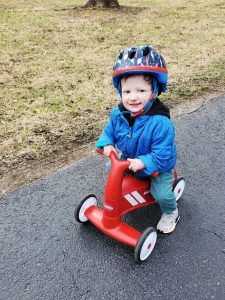
For more information about Rothmund-Thomson Syndrome and nearly 1300 other rare disorders, and to see how you can participate in raising awareness on February 28th, visit the National Organization for Rare Disorders (NORD).










